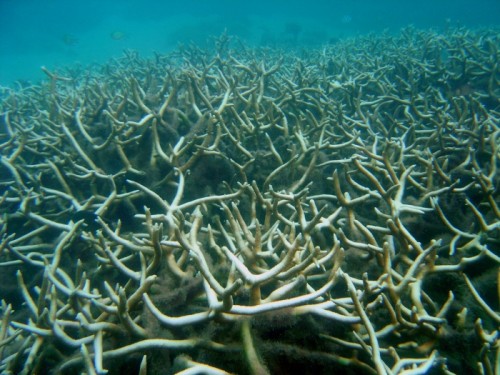Go_golerans - The oceans may be acidifying faster today than they did in the last 300 million years, according to scientists publishing a paper this week in the journal Science.
“What we’re doing today really stands out in the geologic record,” says lead author Bärbel Hönisch, a paleoceanographer at Columbia University’s Lamont-Doherty Earth Observatory.“We know that life during past ocean acidification events was not wiped out–new species evolved to replace those that died off. But if industrial carbon emissions continue at the current pace, we may lose organisms we care about–coral reefs, oysters, salmon.”
The oceans act like a sponge to draw down excess carbon dioxide from the air.
The gas reacts with seawater to form carbonic acid, which over time is neutralized by fossil carbonate shells on the seafloor.
If too much carbon dioxide enters the ocean too quickly, it can deplete the carbonate ions that corals, mollusks and some plankton need for reef and shell-building.
In a review of hundreds of paleoceanographic studies, the researchers found evidence for only one period in the last 300 million years when the oceans changed as fast as today: the Paleocene-Eocene Thermal Maximum, or PETM.
In ocean sediment cores, the PETM appears as a brown mud layer flanked by thick deposits of white plankton fossils.
About 56 million years ago, a mysterious surge of carbon into the atmosphere warmed the planet and turned the oceans corrosive.
In about 5,000 years, atmospheric carbon doubled to 1,800 parts per million (ppm), and average global temperatures rose by about 6 degrees Celsius.
The carbonate plankton shells littering the seafloor dissolved, leaving the brown clay layer that scientists see in sediment cores today.
As many as half of all species of benthic foraminifera, a group of one-celled organisms that live at the ocean bottom, went extinct, suggesting that deep-sea organisms higher on the food chain may have also disappeared, said paper co-author Ellen Thomas, a paleoceanographer at Yale University.
“It’s really unusual that you lose more than 5 to 10 percent of species,” she said.
Scientists estimate that ocean acidity–its pH–may have fallen as much as 0.45 units as the planet vented stores of carbon into the air.
“These scientists have synthesized and evaluated evidence far back in Earth’s history,” said Candace Major, program officer in the National Science Foundation’s (NSF) Division of Ocean Sciences, which funded the research.
“The ocean acidification we’re seeing today is unprecedented,” said Major, “even when viewed through the lens of the past 300 million years, a result of the very fast rates at which we’re changing the chemistry of the atmosphere and oceans.”
In the last hundred years, rising carbon dioxide from human activities has lowered ocean pH by 0.1 unit, an acidification rate at least 10 times faster than 56 million years ago, says Hönisch.
The Intergovernmental Panel on Climate Change (IPCC) predicts that pH will fall another 0.2 units by 2100, raising the possibility that we may soon see ocean changes similar to those observed during the PETM.
More catastrophic events have happened on Earth before, but perhaps not as quickly.
The study finds two other analogs for modern day ocean acidification–the extinctions triggered by massive volcanism at the end of the Permian and Triassic eras, about 252 million and 201 million years ago, respectively.
But the authors caution that because ocean sediments older than 180 million years have been recycled back into the deep Earth, scientists have fewer records to work with.
During the “Great Dying” at the end of the Permian, about 252 million years ago, about 96 percent of life disappeared.
Massive eruptions from what is known as the Siberian Traps in present-day Russia are thought to have triggered earth’s biggest extinction.
Over 20,000 years or more, carbon in the atmosphere rose dramatically.
Scientists have found evidence for ocean dead zones, and preferential survival of organisms predisposed to carbonate-poor seawater and high blood-carbon levels, but so far they have been unable to reconstruct changes in ocean pH or carbonate.
At the end of the Triassic, about 201 million years ago, a second burst of mass volcanism associated with the break-up of the supercontinent Pangaea doubled atmospheric carbon and touched off another wave of die-offs.
Coral reefs collapsed and an entire class of sea creatures, the eel-like conodonts, vanished.
On land, large plant-eating animals gave rise to meat-eating dinosaurs like Tyrannosaurus rex as the Jurassic era began.
A greater extinction of tropical species has led some scientists to question whether global warming rather than ocean acidification was the main killer at this time.
This study finds that the most notorious of all extinctions, the one that ended the Age of Dinosaurs with a falling asteroid 65 million years ago, may



























Tidak ada komentar:
Posting Komentar